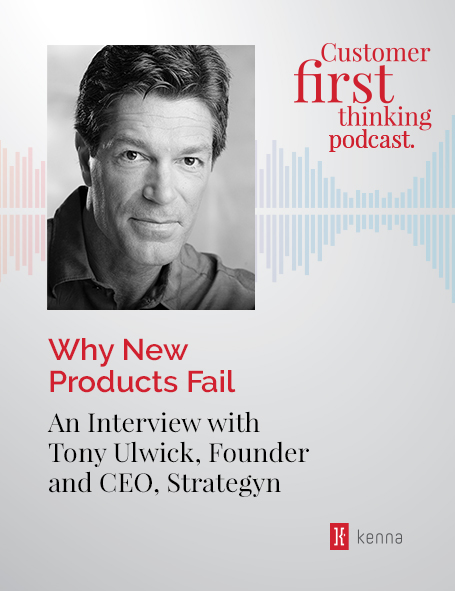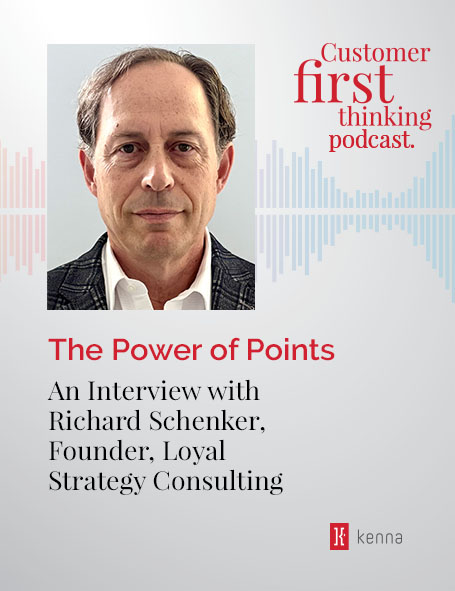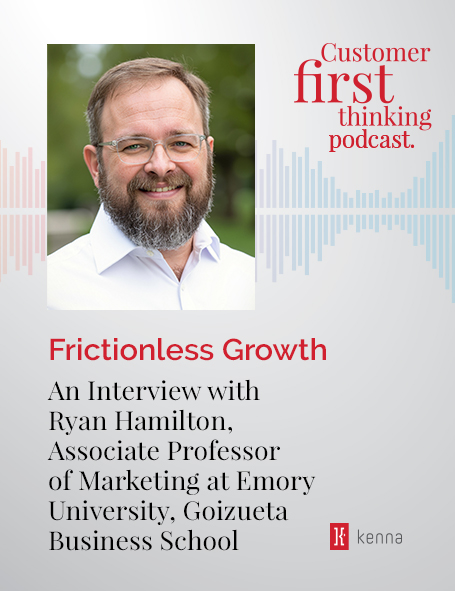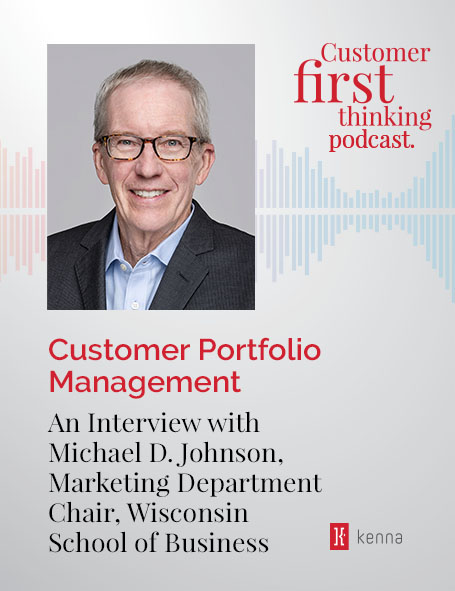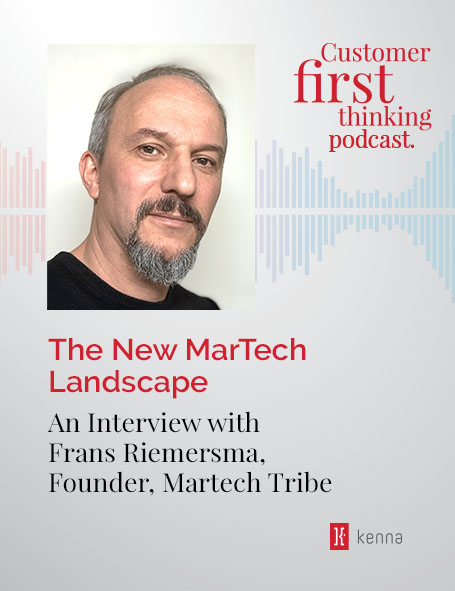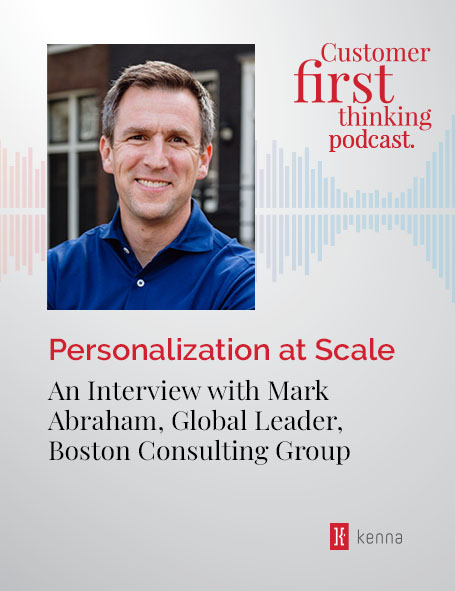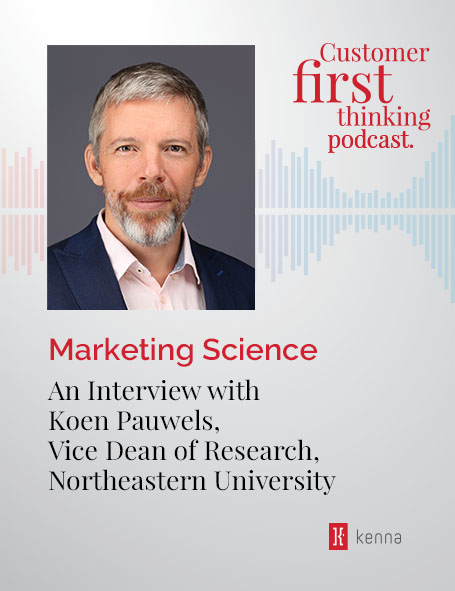Discover Customer First Thinking
Customer First Thinking

Customer First Thinking
Author: Stephen Shaw
Subscribed: 11Played: 109Subscribe
Share
© Copyright 2018/2019 All rights Reserved
Description
Businesses everywhere are struggling with change due to digital disruption. They are now at an inflection point: give up obsolete marketing practices, or risk being denied a meaningful role in the lives of people. The goal is no longer to amplify the voice of the brand – it is to serve the needs and interests of customers at every stage of the relationship lifecycle. This new marketing model is characterized by the strategic embrace of Customer First Thinking, where the emphasis is on delivering a more unified experience for customers. More than simply a platitude, this idea has evolved into a set of governing principles that can transform the corporate role of marketing from brand messenger to customer advocate.
57 Episodes
Reverse
For most companies new product innovation is a game of chance, resulting in many more misses than hits. The reason, according to innovation expert Tony Ulwick, is that they don't take the time to figure out what customers actually need.
Loyalty points programs are more popular than ever. The problem is they lead to transactional relationships where customers are more loyal to the program than the brand. To build true loyalty, advises loyalty expert Richard Schenker, companies must encourage ongoing engagement beyond point collection and redemption.
Rapid brand growth can sometimes lead to incompatibility between new and existing customer segments due to differing needs and expectations. Brand managers can minimize the possibility of segment conflict by anticipating and then carefully managing the relationship between them, according to leading marketing academic Ryan Hamilton.
Marketers tend to overinvest in acquiring new buyers while trying to keep the most valuable customers from leaving. That leaves a lot of customers feeling left out. To correct this imbalance, marketers need a more systematic framework for selective investment in the most promising relationship segments based on growth potential, according to the renowned marketing academic Michael Johnson.
The Martech industry is going through a radical new era of technological transformation which is changing the contours of the marketing technology landscape. A burst of AI-driven growth and innovation is not only making marketing automation tools easier to use, says Martech expert Frans Riemersma, but the evolving "marchitecture" will liberate marketers from the onerous challenges of platform integration and workflow management.
Businesses today finally recognize the strategic urgency of unifying all customer data in an increasingly AI-driven world of personalized engagement. And now the data technology has matured to the point where that goal is more achievable than ever, according to SAP data expert Chris O'Hara.
Personalization at scale has long been a dream of marketers. But until recently it has been more superficial than helpful, constrained by legacy technology and processes. Today, however, AI makes it easier to do than ever before. Now the only thing holding marketers back, according to personalization expert Mark Abraham, is their campaign mindset.
Select excerpts from interviews with some of marketing's most prominent thought leaders on the state of marketing and the need for transformational change.
B2B companies tend to be laggards when it comes to delivering a superior customer experience, focused more on selling than servicing. But as a result of digital disruption, they have finally begun to embrace the need for a better post-sale journey, according to Jim Tincher, a leading expert in B2B experience design.
The market research industry is facing an existential crisis. Brand marketers have lost faith in old school methods of research – too slow, cumbersome and costly, in their view. To regain the trust of marketers, the consumer insights industry has to modernize their practices and start delivering insights that make more of a strategic impact, says Brett Townsend, a leading market research authority.
Buyer Personas have become a standard part of the marketing toolkit for creating customer empathy. But where they can go wrong is failing to reveal why customers make the decisions they do, according to persona design authority Jim Kraus.
These days it can be risky for brands to take a stand on social issues or promote inclusiveness. But if marketers are able to honestly depict the diversity of society in their brand communications, their message has a far greater chance of being heard, according to cultural theorist Anastasia Karklina Gabriel.
Companies still tend to over-invest in the acquisition of new customers while paying scant attention to relationships with existing customers. The solution to correcting that imbalance, argues value creation expert Allison Hartsoe, is knowing the collective lifetime value of all customers, known as customer equity.
CX quality has declined in recent years as companies struggle to keep up with the expectations of customers. But the main reason, according to renowned CX expert Jon Picoult, is that they settle for mediocrity when they should be aspiring to make the experience more distinctive and memorable.
For all its flaws, social media has become the preferred way for people to stay connected with each other. Yet for too long marketers have failed to take it seriously. The time has come, says social media expert Andrew Jenkins, for marketers to give it the respect it deserves.
Brand tracking studies are a standard research tool for marketers who need to understand how people feel about their brand. The problem with them, according to brand health expert Jenni Romaniuk, is that they don't tell marketers what they really need to know to grow their brand.
Content glut has suffocated the chances of discovery for most marketers. The only way for content marketing to succeed, according to renowned content strategist Robert Rose, is to transform content operations teams into specialized publishing units closely attuned to audience interests and needs.
Marketing today has grown far too complex for decisions to hinge on loose assumptions and guesswork. A more disciplined and fact-based approach is needed, supported by rigorous performance analysis, testing and forecasting, according to Koen Pauwels, one of the world's leading marketing scientists.
No one understands what marketing does anymore, least of all the CEO. For marketing to be seen as more of a difference maker, it must expand its role beyond branding, according to Accenture's Brent Chaters, and earn a greater say in the strategic direction of the business.
Marketers have long sought to discover the motivations that explain why people make the decisions and buying choices they do. The answer, according to Valuegraphics founder David Allison, is their values. To make more meaningful connections with customers, marketers must first understand how they differ in their values.


